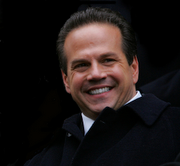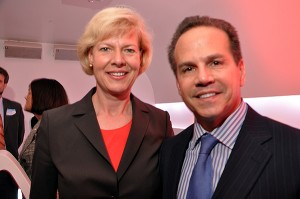National
Gay congressional candidates raking in cash
Contenders in R.I., Calif. doing well, experts say


U.S. Rep. Tammy Baldwin attended a congressional campaign fundraiser Tuesday at Mova for David Cicilline, the gay Democratic mayor of Providence, R.I. (DC Agenda photo by Michael Key)
Non-incumbent gay candidates running for Congress are generally doing a good job of raising money, according to the reported receipts the Federal Election Commission made public after the first quarter of this year.
For the first quarter of 2010, David Cicilline, the gay Democratic mayor of Providence, R.I., has had marked success in fundraising to support his congressional bid. After announcing his candidacy to represent Rhode Island’s 1st congressional district earlier this year, Cicilline has raked in $725,078 for his war chest.
Comparatively, Bill Lynch, a former Rhode Island Democratic Party chair who’s challenging Cicilline for the party nomination, has raised $230,485. John Loughlin, a Republican candidate, has raised $333,763.
Sean Theriault, a gay government professor at the University of Texas, Austin, said Cicilline “looks to be in great shape” heading into the election.
“I would be surprised if he isn’t welcomed into the [LGBT Equality] Caucus after the November elections,” he said.
Denis Dison, spokesperson for the Gay & Lesbian Victory Fund, said the amount of money Cicilline has raised is “hugely significant.”
“This is an open seat and part of the calculus about who’s going to be considered a frontrunner is the ability to fundraise,” Dison said.
For cash on hand, or the amount of money remaining after expenditures in the race, the margin between Cicilline and his Republican opponent is even more pronounced: the Providence mayor has $713,346; Loughlin has $187,537.
“That’s a sign to other donors and to the political establishment that Mayor Cicilline is prepared to fight and win this,” Dison said.
Notable donations to Cicilline’s campaign include $2,400 from the Victory Fund as well as $1,000 from gay lawmaker Rep. Jared Polis’ (D-Colo.) political action committee.
The Human Rights Campaign, which has endorsed Cicilline, also contributed to the campaign. Michael Cole, an HRC spokesperson, said his organization has made $6,000 in direct contributions to the campaign.
“Additionally, we are likely to contribute the full $10,000 allowed by law through a combination of direct and in-kind contributions by the election,” Cole said.
Cicilline’s campaign didn’t respond to a request for comment on his fundraising numbers.
In the race for California’s 45th congressional district, the gay Democrat running for office has also amassed a sizeable war chest, although not as much as the Republican incumbent he’s trying to oust.
Steve Pougnet, the mayor of Palm Springs, Calif., has raised $867,614 in his bid to unseat Rep. Mary Bono Mack (R), who’s raised $1,330,183 to hold on to her seat.
Notable donors to Pougnet include the Victory Fund, which gave $2,400 to his campaign, and Polis, whose PAC contributed $2,000.
Jordan Marks, Pougnet’s campaign manager, said he thinks the fundraising numbers place the candidate in a “great position.”
In the first quarter of 2010, Marks said Pougnet raised about the same amount that Bono Mack raised for her campaign, even though she’s an incumbent. Marks noted that Pougnet raised $304,000 and Bono Mack raised around $320,000 in that time period.
“This quarter is, by far, our best quarter so far,” Marks said. “This quarter proved that for certain we will have the resources that we need to run a really credible campaign, talk about the differences between us and our opponent, and really give the voters an opportunity to make a clear choice.”
Based on the fundraising numbers, Theriault said Pougnet would “be in the hunt” to claim Bono Mack’s seat. But given the challenges that Democrats are expected to face in this year’s election, Theriault wasn’t optimistic about Pougnet’s chances.
“If this were 2006 or 2008, Congresswoman Bono [Mack] would be in serious trouble,” Theriault said. “I suspect that the political winds may save her this time.”
Support for Pougnet among LGBT groups isn’t universal. The Log Cabin Republicans is backing Bono Mack in the race and last year contributed $1,500 to her campaign.
Charles Moran, a Log Cabin spokesperson, said his organization is supporting Bono Mack because the Republican lawmaker voted with the LGBT community when her support was needed. Bono Mack twice voted against the Federal Marriage Amendment and voted in favor of hate crimes legislation and the Employment Non-Discrimination Act.
“We’ve got longstanding relationships with Mary Bono Mack and she’s backed [us] up on a lot of different issues when we’ve needed it,” he said. “We’re proud and have no problem supporting Mary in this race. It was a no-brainer.”
Still, Bono Mack has been criticized for not taking a position on California’s Proposition 8 when it came before state lawmakers and for refraining from endorsing “Don’t Ask, Don’t Tell” repeal.
Noting that Bono Mack amassed more than $1 million in campaign funds, Moran said the lawmaker is “doing well” and that she’s among the best people in the country working to raise money for her campaign.
“It doesn’t really surprise me that her numbers came out so strongly in the fundraising world,” Moran said.
Moran said he expects to see another contribution from Log Cabin to Bono Mack as the general election approaches — although he’s unsure of the amount — and that members of Log Cabin are making individual contributions to her campaign.
HRC hasn’t made an endorsement in the race for California’s 45th congressional district.
Another gay Democrat is running to represent New Jersey’s 7th congressional district in the upcoming election. Ed Potosnak, a former schoolteacher and staffer for Rep. Mike Honda (D-Calif.), is attempting to oust Rep. Leonard Lance (R-N.J.) from his seat.
The first quarter filings reveal that Potosnak has raised $81,007, while Lance has received $772,440 in fundraising. The difference between the two candidates is less pronounced for cash on hand: Potosnak has $64,397 and Lance has $473,880.
Potosnak said he’s “extremely energized and proud” of the support his campaign has received.
“I project a strong showing in the second quarter to advance our positive message,” Potosnak said. “I’m pretty confident that with additional support from our community, we can and we will make up for that difference.”
Noting that he’s unopposed in his Democratic primary, Potosnak said Lance has several challengers in his Republican primary that would “likely deplete his campaign funds” as Lance progresses toward the general election.
The Victory Fund hasn’t made a decision to endorse Potosnak. Dison said he couldn’t comment on the candidate’s fundraising numbers because his organization hasn’t made an endorsement.
Theriault said Potosnak’s numbers don’t bode well for his prospects.
“In today’s political climate, a Democratic challenger needs at least $500,000 to be even a legitimate candidate against a Republican incumbent,” Theriault said. “Mr. Potosnak is about six times short that amount.”
U.S. Supreme Court
Supreme Court to consider bans on trans athletes in school sports
27 states have passed laws limiting participation in athletics programs

The U.S. Supreme Court on Thursday agreed to hear two cases involving transgender youth challenging bans prohibiting them from participating in school sports.
In Little v. Hecox, plaintiffs represented by the ACLU, Legal Voice, and the law firm Cooley are challenging Idaho’s 2020 ban, which requires sex testing to adjudicate questions of an athlete’s eligibility.
The 9th U.S. Circuit Court of Appeals described the process in a 2023 decision halting the policy’s enforcement pending an outcome in the litigation. The “sex dispute verification process, whereby any individual can ‘dispute’ the sex of any female student athlete in the state of Idaho,” the court wrote, would “require her to undergo intrusive medical procedures to verify her sex, including gynecological exams.”
In West Virginia v. B.P.J., Lambda Legal, the ACLU, the ACLU of West Virginia, and Cooley are representing a trans middle school student challenging the Mountain State’s 2021 ban on trans athletes.
The plaintiff was participating in cross country when the law was passed, taking puberty blockers that would have significantly reduced the chances that she could have a physiological advantage over cisgender peers.
“Like any other educational program, school athletic programs should be accessible for everyone regardless of their sex or transgender status,” said Joshua Block, senior counsel for the ACLU’s LGBTQ and HIV Project. “Trans kids play sports for the same reasons their peers do — to learn perseverance, dedication, teamwork, and to simply have fun with their friends,” Block said.
He added, “Categorically excluding kids from school sports just because they are transgender will only make our schools less safe and more hurtful places for all youth. We believe the lower courts were right to block these discriminatory laws, and we will continue to defend the freedom of all kids to play.”
“Our client just wants to play sports with her friends and peers,” said Lambda Legal Senior Counsel Tara Borelli. “Everyone understands the value of participating in team athletics, for fitness, leadership, socialization, and myriad other benefits.”
Borelli continued, “The U.S. Court of Appeals for the Fourth Circuit last April issued a thoughtful and thorough ruling allowing B.P.J. to continue participating in track events. That well-reasoned decision should stand the test of time, and we stand ready to defend it.”
Shortly after taking control of both legislative chambers, Republican members of Congress tried — unsuccessfully — to pass a national ban like those now enforced in 27 states since 2020.
Federal Government
UPenn erases Lia Thomas’s records as part of settlement with White House
University agreed to ban trans women from women’s sports teams

In a settlement with the Trump-Vance administration announced on Tuesday, the University of Pennsylvania will ban transgender athletes from competing and erase swimming records set by transgender former student Lia Thomas.
The U.S. Department of Education’s Office for Civil Rights found the university in violation of Title IX, the federal rights law barring sex based discrimination in educational institutions, by “permitting males to compete in women’s intercollegiate athletics and to occupy women-only intimate facilities.”
The statement issued by University of Pennsylvania President J. Larry Jameson highlighted how the law’s interpretation was changed substantially under President Donald Trump’s second term.
“The Department of Education OCR investigated the participation of one transgender athlete on the women’s swimming team three years ago, during the 2021-2022 swim season,” he wrote. “At that time, Penn was in compliance with NCAA eligibility rules and Title IX as then interpreted.”
Jameson continued, “Penn has always followed — and continues to follow — Title IX and the applicable policy of the NCAA regarding transgender athletes. NCAA eligibility rules changed in February 2025 with Executive Orders 14168 and 14201 and Penn will continue to adhere to these new rules.”
Writing that “we acknowledge that some student-athletes were disadvantaged by these rules” in place while Thomas was allowed to compete, the university president added, “We recognize this and will apologize to those who experienced a competitive disadvantage or experienced anxiety because of the policies in effect at the time.”
“Today’s resolution agreement with UPenn is yet another example of the Trump effect in action,” Education Secretary Linda McMahon said in a statement. “Thanks to the leadership of President Trump, UPenn has agreed both to apologize for its past Title IX violations and to ensure that women’s sports are protected at the university for future generations of female athletes.”
Under former President Joe Biden, the department’s Office of Civil Rights sought to protect against anti-LGBTQ discrimination in education, bringing investigations and enforcement actions in cases where school officials might, for example, require trans students to use restrooms and facilities consistent with their birth sex or fail to respond to peer harassment over their gender identity.
Much of the legal reasoning behind the Biden-Harris administration’s positions extended from the 2020 U.S. Supreme Court case Bostock v. Clayton County, which found that sex-based discrimination includes that which is based on sexual orientation or gender identity under Title VII rules covering employment practices.
The Trump-Vance administration last week put the state of California on notice that its trans athlete policies were, or once were, in violation of Title IX, which comes amid the ongoing battle with Maine over the same issue.
New York
Two teens shot steps from Stonewall Inn after NYC Pride parade
One of the victims remains in critical condition

On Sunday night, following the annual NYC Pride March, two girls were shot in Sheridan Square, feet away from the historic Stonewall Inn.
According to an NYPD report, the two girls, aged 16 and 17, were shot around 10:15 p.m. as Pride festivities began to wind down. The 16-year-old was struck in the head and, according to police sources, is said to be in critical condition, while the 17-year-old was said to be in stable condition.
The Washington Blade confirmed with the NYPD the details from the police reports and learned no arrests had been made as of noon Monday.
The shooting took place in the Greenwich Village neighborhood of Manhattan, mere feet away from the most famous gay bar in the city — if not the world — the Stonewall Inn. Earlier that day, hundreds of thousands of people marched down Christopher Street to celebrate 55 years of LGBTQ people standing up for their rights.
In June 1969, after police raided the Stonewall Inn, members of the LGBTQ community pushed back, sparking what became known as the Stonewall riots. Over the course of two days, LGBTQ New Yorkers protested the discriminatory policing of queer spaces across the city and mobilized to speak out — and throw bottles if need be — at officers attempting to suppress their existence.
The following year, LGBTQ people returned to the Stonewall Inn and marched through the same streets where queer New Yorkers had been arrested, marking the first “Gay Pride March” in history and declaring that LGBTQ people were not going anywhere.
New York State Assemblywoman Deborah Glick, whose district includes Greenwich Village, took to social media to comment on the shooting.
“After decades of peaceful Pride celebrations — this year gun fire and two people shot near the Stonewall Inn is a reminder that gun violence is everywhere,” the lesbian lawmaker said on X. “Guns are a problem despite the NRA BS.”
-

 Sports5 days ago
Sports5 days agoTrans cyclist’s victory sparks outrage in conservative media
-

 Congress5 days ago
Congress5 days agoCongress passes ‘Big, Beautiful Bill’ with massive cuts to health insurance coverage
-

 Israel5 days ago
Israel5 days agoActivist recalls experience in Tel Aviv after Israel-Iran war began
-

 Celebrity News5 days ago
Celebrity News5 days agoNina West’s ‘Sugar in the Tank’ tour comes to Rehoboth Beach










